Toronto Seminar On Iran Cancelled Over Security Concerns
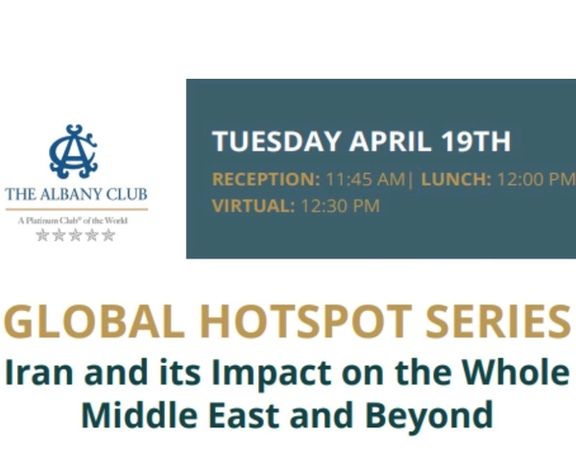
A seminar organized to discuss the Islamic Republic’s actions and impacts on the Middle East and beyond has been cancelled due to security concerns.

A seminar organized to discuss the Islamic Republic’s actions and impacts on the Middle East and beyond has been cancelled due to security concerns.
Bryan E. Leib, the executive director of Iranian Americans for Liberty, who was among the panellists of the event told Iran International on Thursday that the seminar was cancelled when organizers found out that two of the participants -- Mark Dubowitz and Victoria Coates -- are on the Islamic Republic’s sanctions list.
The event was scheduled to be held on Tuesday, April 19, at the Albany Club in the Canadian city of Toronto.
“The event organizers were alerted of security concerns and in an abundance of caution, the event was cancelled”, Leib said, adding that “We will be rescheduling this event with proper security precautions because we will never stop speaking out against the malign influence of the Islamic Republic of Iran throughout the world."
Dubowitz is a South African-born Canadian-American attorney and the CEO of the Foundation for Defense of Democracies, a non-profit think-tank and advocacy institute with a critical focus against Iran’s clerical government. He is known as a proponent of sanctions against Iran and was a leading critic of the Iran nuclear agreement.
Coates is an American political consultant who served as the Deputy National Security Advisor for Middle East and North African Affairs in former president Donald Trump’s administration.
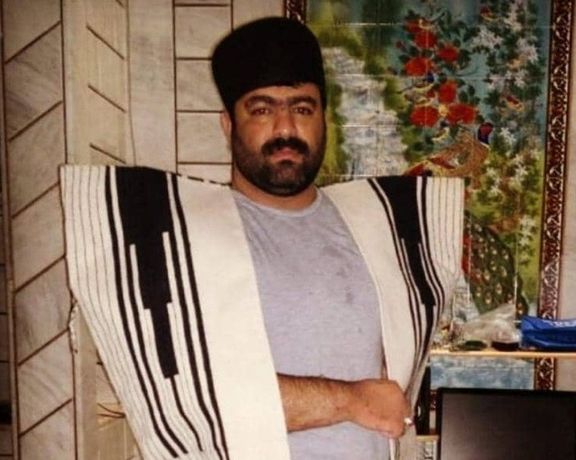
An Iranian political prisoner, who was arrested during mass protests in December 2017, has died due to the injection of an unknown substance in prison.
Mehdi Salehi, whose death was announced in social media on Thursday, had a stroke and went into a coma in January because of the injection of an unknown drug by Esfahan prison officials, human rights monitors said at the time.
A source close to Salehi's family told Iran International that he was chained to the bed in hospital. Recently, he had come out of coma but suddenly the family was told that he passed away.
He was among five protesters sentenced to death, with Iran Human Rights Organization warning about the possibility of authorities secretly executing them.
Large nationwide protests in December 2017 were triggered by rising prices and turned into anti-Islamic-Republic unrest in over 100 cities and towns. Hundreds of striking and protesting workers and labor activists have also been arrested since 2017, many spending months in prison. Some are still detained without trial.
In a report released this week, Amnesty International slammed Iran for prisoner deaths resulting from deliberate denial of medical care, turning prisons into "waiting rooms for death".
The global rights organization has documented how prison authorities routinely cause or contribute to deaths in custody, including by blocking or delaying prisoners’ access to emergency hospitalization.
Sixty-four of all these prisoners died inside their prison cells meaning they were not given even basic medical supervision in their final hours.
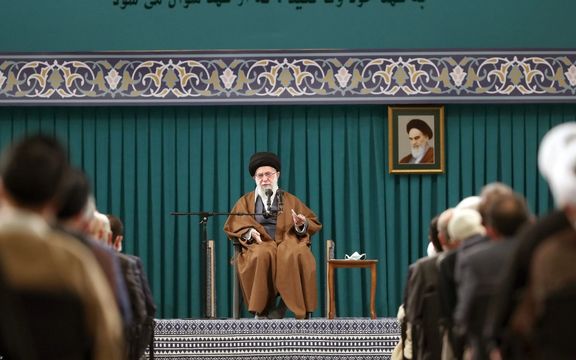
Iranian pundits and critics have been busy reviewing two Ramadan gatherings this week in Tehran to read into politics and politicians in the Islamic Republic.
An April 12 iftar (Ramadan fast breaking) at the Islamic Republic Leader Ali Khamenei's house and a similar party at the office of the Iranian President Ebrahim Raisi on April 10, attracted a lot of media attention for the wrong reasons.
Such banquets are annual traditions of the Leader and President's office during Ramadan. For the hosts, it is a show of their grandeur and their support base among the elite. For the guests it is an opportunity to show off their connections with men of power. For the privileged photographers it is a chance to highlight anything that is odd, interesting, or out of the ordinary.
The meeting with Khamenei turned out to be controversial the following day as his office corrected part of his speech in which he had praised "the progress in the nuclear negotiations." The correction changed it to "progress in Iran's diplomacy" in general.
Other than that, the most important thing about the meeting at Khamenei's house was the photographs that could provide ammunition for analysts whose work is based on the cold war model of Kremlinology, that is playing with the slightest nuance and body language that could mean something consequential.
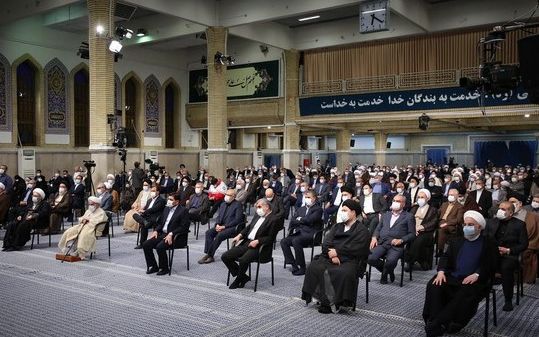
The photographs showed, among others, former president Hassan Rouhani and former foreign minister Mohammad Javad Zarif. Many hardliners would have preferred not to see them again anywhere near Khamenei. One social media user opined that their presence was like bathing them with water and soap and cleansing them of the charges that could have landed them in jail.
This was a reference to the fact that hardliners who blame Rouhani for all the failures of the regime, have been calling for his prosecution. Others assumed that Zarif's statement in a leaked audio last year in which he said the IRGC carried out Russia's orders, would permanently kick him out of the elite Khamenei accepts.
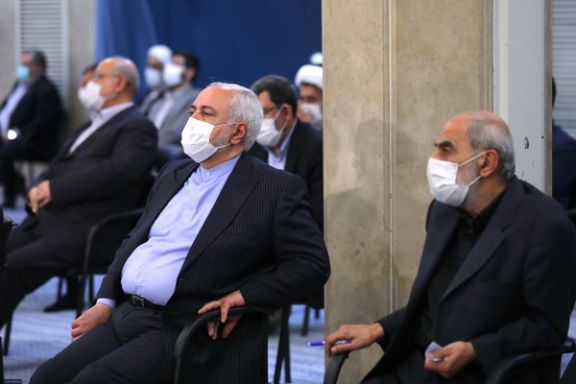
Others seen in photographs included former Majles Speaker Ali Larijani and his brother Former Judiciary Chief Sadeq Amoli Larijani. The former was believed not to be an insider any longer following his disqualification as a candidate in the 2021 presidential election and the latter was accused of financial corruption.
It was significant that Rouhani and Amoli Larijani were sitting in the first row in front of the Supreme Leader. Everyone had assumed that both had been banished by Khamenei for the foreseeable future.
Another notable point about Rouhani was that he was the only former president at the meeting. Reformist Mohammad Khatami and Mahmoud Ahmadinejad were nowhere to be seen.
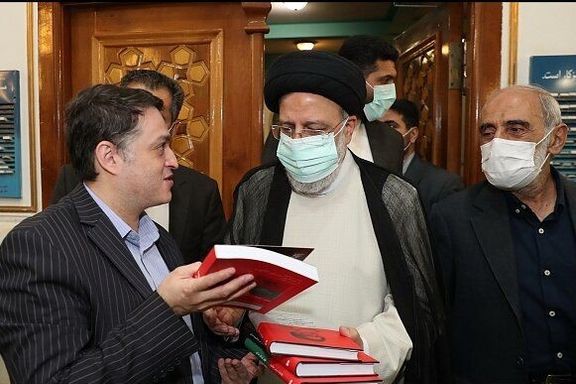
Like this meeting, which was attended by almost everyone who is anyone in Iran, the April 11 meeting at Raisi's office was attended by hardliners as well as pro-reform media and political figures. The juxtaposition was best highlighted by the pictures that showed pro-reform editor of Sazandegi newspaper Mohammad Ghoochani in friendly scenes with hardliner Kayhan newspaper's firebrand editor Hossein Shariatmadari.
This probably showed a high-level decision not to ignore the so-called reformists who have lost a lot of popularity. The result was to see characters like the two editors under one roof. Many social media users pointed out the fact that these characters with their “sham conflicts” in their papers and their friendly gestures in the photos are “birds of the same feather” and it is meaningless to talk about them as representing diagonally opposing political factions in the Islamic Republic.
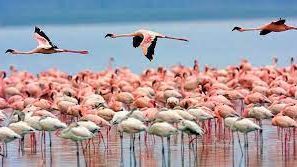
A group of more than 300 Iranian university professors, scholars, and environmentalists has written to Iran’s Supreme Leader opposing a petrochemical project scheduled for northern Iran.
In a letter published Thursday, they asked Ali Khamenei to intervene and stop the petrochemical plant near the Miankaleh wetland, Mazandaran province, which they say will have adverse environmental impacts on the coastal region. Politicians supporting the plant − which will convert natural gas to propylene, which has a range of uses in manufacturing − say it would create 75,000 jobs, but offer no evidence.
The environmentalists’ letter argued Iran already had sufficient propylene, and that a similar project in northern Iran begun by the Golestan Petrochemical company 17 years ago was in limbo although local ranches had been destroyed. The letter alleged there were around 90 abandoned petrochemical projects across the country, for which 40 construction permits had been issued under the previous government of President Hassan Rouhani.
They added that the area earmarked for the petrochemical unit in Miankaleh was high-quality agricultural land and was near to an international Unesco biosphere reserve. The environmentalists said that some work on the site – opponents of the development Tuesday cited welding for fencing and other preparations – was going on despite this week’s orders from President Ebrahim Raisi and the supreme court to pause or halt construction.
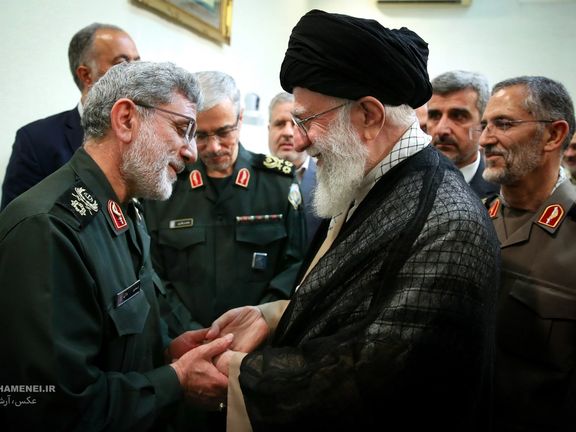
Iran will support all those who fight against “the Zionist regime” and speed up its destruction, the commander of the IRGC's Qods (Quds) Force said Thursday.
Esmail Ghaani (Qaani) also issued a threat that Iran will harshly confront Israel "wherever it feels necessary", local media reported.
"Wherever we identify a Zionist threat, we will harshly confront them, they are too small to confront us," he said.
He was speaking at a memorial service for the Revolutionary Guard (IRGC) general, Mohammad Hejazi who passed away last April, in what was said to be injuries he sustained in a chemical attack during the Iran-Iraq war. However, reports after his death mentioned Covid-19 as a possible cause.
Ghaani praised recent terror attacks against Israeli civilians that has killed 14 people. “The youth of the resistance [front] with their operation have disrupted the whole system of the Zionist regime. One Palestinian youth shakes the foundations of the Zionists, who make noise that they want to fight Islamic Iran,” the commander of IRGC’s extraterritorial force said.
Ghaani assumed the command of the Qods Force after Qasem Soleimani was killed in a US drone strike in Baghdad in January 2020. Former US president Donald Trump had approved the targeted killing, for which Tehran has vowed revenge against former US officials.
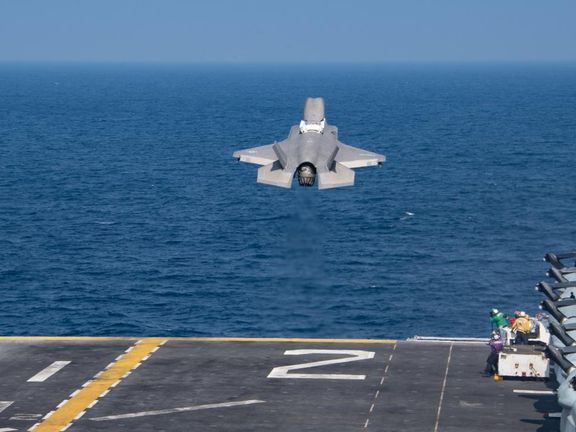
The US Navy says it is setting up a new multinational task force to patrol the waters around Yemen following attacks attributed to Iran-backed Houthi rebels.
Vice Admiral Brad Cooper, who oversees the Navy’s 5th Fleet based in Bahrain, said on Wednesday that the task force would ensure a force presence and deterrent posture in the “strategically important” Red Sea, Bab al-Mandab Strait and Gulf of Aden.
The force will be commissioned Sunday to target arms smuggling as well as trafficking of people and drugs, Cooper told reporters.
The announcement comes as Washington is seeking to reassure Saudi Arabia and the United Arab Emirates by providing additional military support following a series of missile and drone attacks on the Persian Gulf nations in recent months. Vessels in waters around Yemen are crucial for global trade, including oil supplies, and vessels have in the past been targeted by the Houthis and other forces.
According to Cooper, the new task force will impact the Yemeni Shia rebels’ ability to obtain the weaponry needed for such attacks.
Iran has long been accused of smuggling weapons to the Houthis, a charge Tehran denies.
The new naval task force will consist of up to eight vessels and will be part of the 34-nation Combined Maritime Forces, which has three other task forces in nearby waters targeting smuggling and piracy.
Its launch comes amid a two-month truce in the nearly seven-year Yemen war that has killed tens of thousands of people and displaced millions more.
With reporting by Reuters